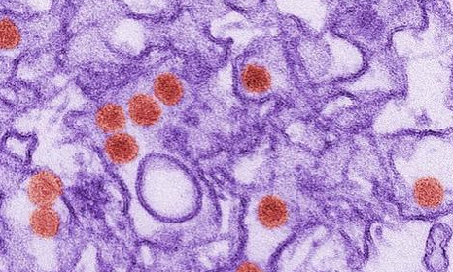
Zika virus photo courtesy of the CDC.
County News Service
February 27, 2016 (San Diego) -- A San Diego resident who traveled to Colombia and returned in January 2016 is the first Zika virus case reported in the region this year, the County Health and Human Services Agency announced today.
The woman is believed to have contracted the virus while in Colombia, was not pregnant and was not hospitalized. She has fully recovered, similar to the two previous cases of travel-associated Zika infections reported in San Diego. A local Zika virus case was reported in July 2014 and another in July 2015. Both people contracted the virus while visiting tropical islands in the South Pacific.
“There is no immediate threat from Zika if people have not traveled to known affected areas,” said Wilma Wooten, M.D., M.P.H., County public health officer. “Anyone who is planning travel to a country with active Zika virus transmission should consult their doctors before leaving, especially if they are pregnant or are considering becoming pregnant.”
Zika virus is transmitted mostly through mosquito bites, but a man who has Zika can transmit the virus to his sex partners. Men who travel from Zika-affected countries should protect their partners, especially women who are trying to become pregnant, by following CDC guidelines.
According to the Centers for Disease Control and Prevention (CDC), there have been no reported mosquito-transmitted cases of Zika in the continental United States. Thirty-five countries and territories in the Americas, Africa and the Pacific Ocean have recently reported locally acquired Zika infections. Although Mexico has reported cases from local mosquitos, none have been in Baja California. An up-to-date list of Zika-affected countries can be found at the CDC Zika virus Web page.
Zika Virus
The CDC reports that only one out of every five people who get infected with the Zika virus ever experience any illness. If people do get sick, their symptoms are usually mild and may include fever, rash, joint pain or conjunctivitis (red eyes).
Symptoms typically begin two to seven days after being bitten by an infected mosquito. However, the CDC also reports that the Zika virus has been suspected to cause a severe birth defect — microcephaly, a condition where babies heads and brains are smaller than normal — in cases in which mothers were infected during pregnancy. There currently is no vaccine or treatment for Zika virus. The CDC has issued traveler’s warnings urging pregnant women not to travel to countries where Zika is present.
Mosquitoes
The mosquitoes known to transmit the Zika virus, primarily the Aedes aegypti (yellow-fever mosquito), but also the Aedes albopictus (Asian tiger mosquito), are not native to San Diego. But they have been discovered here — the yellow-fever mosquito in 2014 and the Asian tiger mosquito in 2015.
These invasive Aedes mosquitoes are different than the mosquito species native to San Diego County. They are black and have distinctive white stripes. And unlike our native mosquitoes, they like to feed during daylight hours and are known to be aggressive biters.
The San Diego County Department of Environmental Health Vector Control Program has been encouraging residents to protect themselves from mosquitoes since 2003, when another virus — the West Nile virus — showed up in California. The invasive mosquitoes that can transmit the Zika virus like to live and breed in urbanized areas — including inside homes and backyards — and can breed in containers as small as a thimble. The Vector Control Program routinely monitors and works to control mosquito populations, responds to complaints, and reduces or treats mosquito breeding sources.
County officials said the public should remember to follow the “Prevent, Protect, Report” guidelines:
Prevent mosquito breeding sites. Every week, dump out and clean containers that hold water inside and outside homes. Fill plant saucers with sand or fine gravel so water won’t form pools where mosquitoes can breed.
Protect yourself from mosquito bites. Wear long sleeves and pants when outdoors. Use insect repellent, preferably one containing DEET. Make sure the screens on your windows and doors are in good condition, do not have holes or tears, and are secured to keep insects out.
Report if you are being bitten by mosquitoes during daylight hours, or if you find mosquitoes that match the description of the yellow-fever mosquito or Asian tiger mosquito, by contacting the Vector Control Program at (858) 694-2888 or vector@sdcounty.ca.gov.
For more information about the Zika virus, go to the County Zika virus Web page.







Recent comments